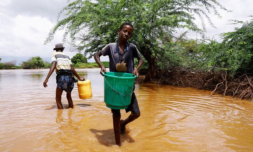In response to a rapidly escalating cholera outbreak, the government of Zimbabwe has declared a state of emergency, acknowledging the severity of the crisis that has claimed lives and left thousands grappling with the debilitating effects of the waterborne disease.
Cholera, a highly contagious bacterial infection spread through contaminated water and food, has overwhelmed Zimbabwe’s healthcare system, posing a significant threat to public health.
The outbreak, which was initially reported in several regions across the country, has now reached alarming proportions, with more than 7,000 cases recorded and upwards of 200 suspected cholera deaths.
The rapid spread of the disease has strained the capacity of medical facilities and resources. This is especially true within the capital Harare, where more than half of all confirmed cases have been reported.
Overcrowded hospitals are struggling to provide adequate care to a growing number of patients, and there are reports of shortages in essential medical supplies and clean water nationwide.
The Zimbabwean Ministry of Health and Child Care (MoHCC) confirming an active state of emergency, emphasized the need for urgent international assistance to curb the outbreak amid the ongoing floods caused by heavy downpour.
As with the relentless extreme weather currently sweeping through East Africa, the severity and regularity of these perilous events both appear intrinsically linked to heatwaves spurred by anthropogenic climate change.
Coupled with poor economies – like that of Zimbabwe, Malawi, Zimbabwe, Mozambique, etc – contaminated water sources, and poor hygiene practices, and you’ve the ideal breeding ground for the cholera bacterium.
Response teams are also reported to be encountering challenges in reaching individuals requiring assistance due to the inaccessibility of roads and damage to infrastructure. Crucially, floodwaters have paralyzed several cholera treatment units, contributing to a surge in cases within condensed areas.




















